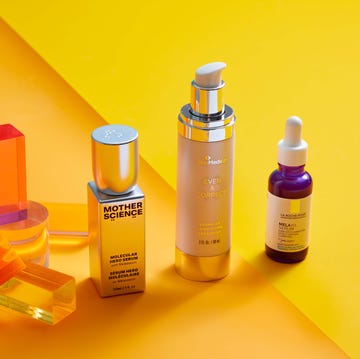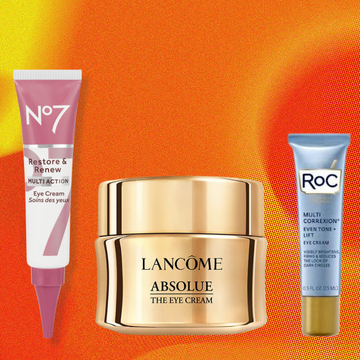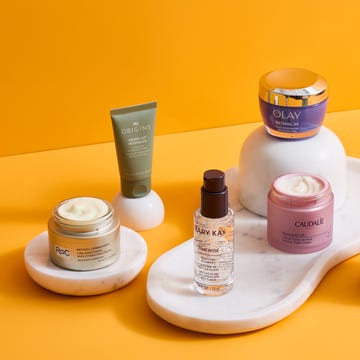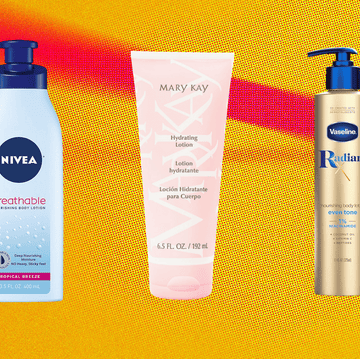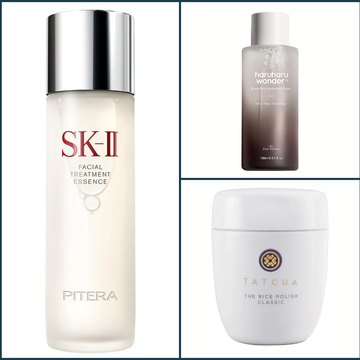By most accounts, retinol has been perceived as a skincare powerhouse. The ingredient has been touted for its anti-aging, skin smoothing, texture improving and tone evening properties. But along with all of its benefits come some dangers if it is used improperly.
“It is important to be mindful of what you combine with retinol because some ingredients may cause irritation or reduce effectiveness,” says Good Housekeeping Institute Beauty, Health & Sustainability Lab Director Sabina Wizemann.
In addition to being aware of specific ingredients that can cause adverse effects when combined with retinol, it is important to remember that using the powerful ingredient can also increase the skin’s sun sensitivity. “Pairing sunscreen with retinol is always a good idea. You would use sunscreen in the morning and retinol at night,” says Caroline Chang, M.D. FAAD, a board certified dermatologist and owner of Rhode Island Dermatology Institute. “[I]t is important to pair retinol use with sunscreen so that you can maintain and further the anti-aging benefits of the retinol.”
To learn more about the ingredients you should avoid while using retinol as well as ingredients that pair well with retinol, we tapped Chang and Wizemann to break down how to use the skincare ingredient safely and most effectively.
Don't mix: Retinol with AHAs and BHAs
Alpha-hydroxy acids (AHAs) and Beta-hydroxy acids (BHAs) are chemical exfoliants that serve the purpose of sloughing off the top layer of skin to expose the baby-soft, even toned new skin underneath. When these actives come in contact with retinol, adverse effects can happen. “The exfoliating effect of AHA and BHA in combination with retinol can overwhelm and damage the skin barrier and increase sensitivities to sun,” Wizemann says. She adds that same goes for physical exfoliants like scrubs and abrasive materials.
What to do: Should you need to use both of these ingredients in your skincare routine, it's best to err on the side of caution. “Alternating nights is a good option, or using acids once a week on the night you do not apply retinol,” Wizemann adds.
Don't mix: Retinol with Vitamin C
Typically used to brighten skin, reduce dark spots, firm skin and produce collagen and enhance UV protection, vitamin C is another ingredient to steer clear of combining with retinol. Chang says mixing retinol with other acids, such as vitamin C, can irritate the skin. “This can show up as redness, dry skin, peeling skin or increased sun sensitivity.”
What to do: It's best to keep these ingredients separate in your skincare routine. While you may use a vitamin C serum in the morning, you should reserve retinol use for nighttime.
Don't mix: Retinol with Benzyl Peroxide
Another ingredient that doesn't mix well with retinol is benzyl peroxide. The ingredient is typically used for treating and preventing acne, but when used with retinol, it can decrease its efficacy and cause skin irritation. “[Benzyl peroxide] will oxidize the retinol,” says Chang. “The effect is that the retinol will be less effective.” Wizemann also adds that the bactericidal agent is also known to be drying, which doesn’t fare well with retinol’s properties.
What to do: Should you use both of these ingredients in your skincare routine, Chang notes that they should be used at different times. “To avoid [irritation], apply benzyl peroxide products in the morning and tretinoin/retinol products in the evening,” she says. “The exception to this is adapalene [a topical retinoid used for treating acne], which can be mixed with benzoyl peroxide.”
Ideal retinol pairs
Skincare ingredients that are hydrating and soothing to the skin typically pair well with retinol, according to Wizemann. “Any hydrating and barrier-supporting ingredients like HA acid, glycerin, and ceramides, and anti-inflammatory ingredients like cica and green tea,” she said, adding that colloidal oatmeal is also good for irritated skin and has soothing benefits if needed.
Chang also shares that vitamin E can be a beneficial pair for retinol. “Vitamin E is a fat-soluble vitamin, so pairing retinols with an oil or cream can help to increase skin absorption and possibly boost its effect,” she said.
The bottom line
When using retinol, it is important to consider how it will interact with other ingredients in your skincare routine. In most cases acids and exfoliants should not be combined with retinoids, while hydrating ingredients tend to pair well with them. Also be sure to incorporate sunscreen as using a retinol can make skin more susceptible to sun sensitivity.
Sabina (she/her) is the director of the Beauty, Health & Sustainability Lab at the Good Housekeeping Institute, where she has overseen skincare, haircare and makeup testing since 2012. She also reviews applications, substantiates claims and evaluates products for the GH Seal and the Beauty Awards and Sustainability Awards programs. She has a B.S. in chemistry from Ithaca College and more than 16 years of experience working in the pharmaceutical and personal care industries.




